|
|
|
Sort Order |
|
|
|
Items / Page
|
|
|
|
|
|
|
| Srl | Item |
| 1 |
ID:
096540
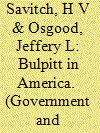

|
|
|
| 2 |
ID:
191847
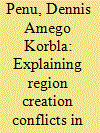

|
|
|
|
|
| Summary/Abstract |
For the first time in its history, Ghana held a referendum in 2018 to divide some of its regions to create new ones. Though the regions are purely administrative, the division faced resistance in some areas and not in others. This study combines qualitative comparative analysis with process tracing to show that the resistance occurred within regions with relatively high support for the opposition party, but only in the combined presence of (traditional) elites competing from either side of the region and controversies regarding claims to (traditional) political authority. Further, it finds a bottom-up mechanism of the resistance, evolving as the threatened interests of stakeholders grew from the community to the regional, national and diaspora levels. As in other African cases, this suggests that the sources of conflicts in Africa are not so much about ethnic differences but more about elites’ unequal access to political and economic resources.
|
|
|
|
|
|
|
|
|
|
|
|
|
|
|
|
| 3 |
ID:
124891
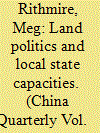

|
|
|
|
|
| Publication |
2013.
|
| Summary/Abstract |
Despite common national institutions and incentives to remake urban landscapes to anchor growth, generate land-lease revenues and display a capacious administration, Chinese urban governments exhibit varying levels of control over land. This article uses a paired comparison of Dalian and Harbin in China's north-east to link differences in local political economies to land politics. Dalian, benefiting from early access to foreign capital, consolidated its control over urban territory through the designation of a development zone, which realigned local economic interests and introduced dual pressures for enterprises to restructure and relocate. Harbin, facing capital shortages, distributed urban territory to assuage the losers of reform and promote economic growth. The findings suggest that 1) growth strategies, and the territorial politics they produce, are products of the post-Mao urban hierarchy rather than of socialist legacies, and 2), perhaps surprisingly, local governments exercise the greatest control over urban land in cities that adopted market reforms earliest.
|
|
|
|
|
|
|
|
|
|
|
|
|
|
|
|
| 4 |
ID:
180256
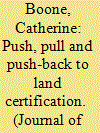

|
|
|
|
|
| Summary/Abstract |
Since 2000, many African countries have adopted land tenure reforms that aim at comprehensive land registration (or certification) and titling. Much work in political science and in the advocacy literature identifies recipients of land certificates or titles as ‘programme beneficiaries’, and political scientists have modelled titling programmes as a form of distributive politics. In practice, however, rural land registration programmes are often divisive and difficult to implement. This paper tackles the apparent puzzle of friction around rural land certification. We study Côte d'Ivoire's rocky history of land certification from 2004 to 2017 to identify political economy variables that may give rise to heterogeneous and even conflicting preferences around certification. Regional inequalities, social inequalities, and regional variation in pre-existing land tenure institutions are factors that help account for friction or even resistance around land titling, and thus the difficult politics that may arise around land tenure reform. Land certification is not a public good or a private good for everyone.
|
|
|
|
|
|
|
|
|
|
|
|
|
|
|
|
| 5 |
ID:
154734
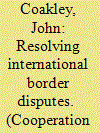

|
|
|
|
|
| Summary/Abstract |
This article explores the value of a specific model of norm replacement in accounting for the circumstances leading to Ireland’s Good Friday agreement (1998), which formally and finally settled the long-running territorial dispute between Ireland and the United Kingdom (UK). Drawing on the theoretical literature, it identifies three phases in this process. First, from the creation of the Irish Free State in 1922 until the civil unrest in Northern Ireland peaked in 1972 the irredentist norm was substantially unchallenged. It was embedded in the 1937 constitution, which defined the national territory as extending over the whole island of Ireland – including Northern Ireland, a part of the UK. The second phase, from about 1972 to 1998, was one of norm competition. The irredentist norm was severely challenged by new political realities in Northern Ireland, and was potentially destabilising for the state itself. It was increasingly challenged by an alternative ‘consent’ norm, one embracing in effect the geopolitical status quo. The third phase, from 1998 onwards, was one of consolidation of the new norm, now written into the Irish constitution to replace the wording of 1937. The article suggests that this model plays a valuable role in accounting for the changing status of the Irish border, but also that the Irish experience has implications for the broad shape of the model.
|
|
|
|
|
|
|
|
|
|
|
|
|
|
|
|
| 6 |
ID:
108063
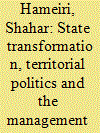

|
|
|
|
|
| Publication |
2011.
|
| Summary/Abstract |
The perceived emergence in recent years of potentially cataclysmic transnational risks has been a growing concern for policymakers and practitioners, as well as an area of considerable scholarly interest. Existing sociological approaches to the study of risk, which have become influential in a range of related social scientific fields, highlight important dimensions of this phenomenon, but are unable to adequately explain why these risk depictions have emerged at this historical juncture. Nor are they capable of providing a systematic explanation for variation in the adoption of risk depictions and related modes of governance in different functional areas and geographic regions. Drawing on the insights of political economy and critical political geography, it is argued that the current preponderance of transnational risk depictions and associated modes of governance should be understood in the context of processes of state transformation, linked to the transnationalisation of finance and production, which challenge the fit between state power and national territorial borders. From this perspective, risk and risk management are mechanisms in a contested process of rescaling, in which governance functions traditionally associated with the national state are shifted to regional or even global modes of governance. Understanding the dynamics of this territorial politics is important for learning about the current and evolving nature of political rule within and beyond the state.
|
|
|
|
|
|
|
|
|
|
|
|
|
|
|
|
|
|
|
|
|